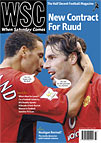 Good enough for the World Cup, but not for the bench of a struggling Premiership side? Jules Brandon wonders what has gone wrong for Wolves’ star buy from Nigeria
Good enough for the World Cup, but not for the bench of a struggling Premiership side? Jules Brandon wonders what has gone wrong for Wolves’ star buy from Nigeria
On the evening of July 7 last year, Wolves called a press conference for the next morning, promising to unveil a new mystery signing. The club had just signed Oleg Luzhny from Arsenal, but there was a sense that this next deal might be bigger and better. If there was a slight air of anti-climax, not to mention bafflement, when the latest acquisition was revealed as Isaac Okoronkwo, it set the tone nicely.
Dave Jones bagged the Nigerian on a Bosman, after he had spent three years in Ukraine with Shakhtar Donetsk. The delighted Wolves manager said: “It’s a great boost for us to have signed a 25-year-old international with his experience.” He confidently declared: “A player who could cope in the Ukraine top league would have no problem adapting to the Premiership.”
The player himself was even surer of a rosy future at Molineux: “When I come into a team I expect to take my place immediately,” was his forthright opening address to the British press. Things haven’t quite gone to script. Seven months on and Jones hasn’t offered him a single start. At the time of writing, Okoronkwo has had just the one (non-playing) cameo on the bench in a Carling Cup fixture to add to his six minutes in a pre-season friendly against Boavista. In comparison, he is making the capture of Luzhny look inspired.
Jones should not take too much of the blame: the signing made sense. A physical and pacy stopper, Okoronkwo was the only ever-present in Nigeria’s back four in the 2002 World Cup. Joseph Yobo, his regular international partner, had flourished in his initial couple of seasons in England, as had others from the national side. And while his better known compatriot at Shakhtar, Julius Aghahowa, indulged in backflips and moaned to the press about the climate, Okoronkwo seemed the model pro, keeping his head down and resisting efforts to agitate publicly for a move. He seemed, in short, like a pretty good bet.
Wolves, moreover, had fought off competition to sign him. Until the last, the favourites had been Bolton. They almost got as far as the medical, before Okoronkwo had to fly home to play a friendly against Brazil. Bobby Robson had been curious enough to fly Okoronkwo in for a trial in December 2002, before the opportunity to land Jonathan Woodgate emerged.
Okoronkwo’s situation was confused, as is often the case, by the involvement of multiple agents, with the vociferous opinions of his advisor Michael Emenalo – who played for Nigeria in the 1994 World Cup – not always chiming with the views of his British representative. That Okoronkwo opted at the final minute for the Black Country relegation favourites over Sam Allardyce’s upwardly mobile lot (and the reassuring presence of friend and national-team captain Jay-Jay Okocha) suggested that he had either been given a very dodgy steer, or Wolves had dug very deep to lure him.
His subsequent disappearing act has not escaped the attention of the pundits at Sky. Last November, in a season not short on contenders, they dubbed him the Premiership’s worst acquisition. Some of the panic purchases and loan deals completed in January’s transfer window will, doubtless, throw up plenty more competition, but so far he looks a pretty worthy winner.
Okoronkwo’s inability to notch up any appearances in Wolves’ back four, or even secure a regular spot on the bench, seems all the more surprising given the defensive woes that Dave Jones’s men have endured this season. When the papers run their match previews, the Nigerian doesn’t even feature among the ranks of the unavailable or injured.
The player himself claims to have been left confused and angry by the whole experience. “The people who are playing in the team are not better than me, there is something else causing the problem. I don’t know what it is exactly because I spoke with Dave Jones a few times and he didn’t tell me what it was.”
Has he simply failed, in Jones’s view, to cut the mustard in training? Or, as rumours have it, has he rubbed his manager up the wrong way by complaining that he can’t motivate himself to play in the reserves? He remains an international man of mystery.
From WSC 205 March 2004. What was happening this month